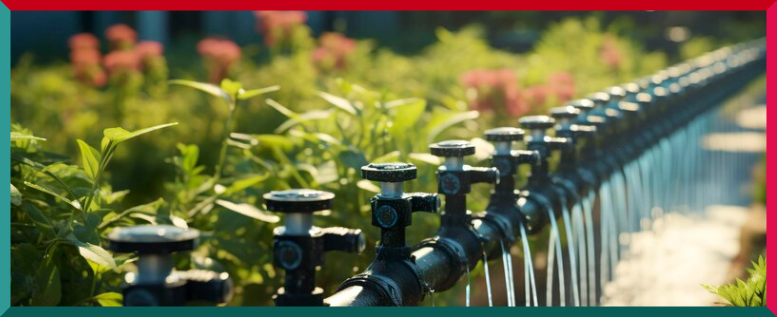
While the Earth is approximately 75% water, only 3% of it is freshwater, and agriculture consumes over 70% of that freshwater for irrigation. With climate change intensifying water scarcity, the global freshwater supply is under increasing pressure.
An immediate solution to this crisis is optimizing water usage and minimizing wastage, particularly in agriculture, where inefficient irrigation practices often lead to significant water loss.
Adopting sustainable irrigation systems can revolutionize agricultural and landscaping water management.
Adopting sustainable irrigation systems can revolutionize agricultural and landscaping water management, helping conserve water while ensuring optimal crop growth.
In this post, we’ll dive into the most efficient and various sustainable irrigation methods that are shaping the future of agriculture and gardening.
Before diving into the list, do consider some of the facts deciding which irrigation is suitable for you.
Factors to Consider for Installing a Sustainable Irrigation System
Soil Type
Soil type plays an important factor in deciding the irrigation type because different types of soil have different water-holding capacity and drainage rates.
Plant Watering Need
The second factor after the soil is plants. Different types of plants require different watering needs. Factors like the age of plants and growth rate also matter for irrigation.
Water Source
Even sustainable irrigation systems require different watering needs. Using alternative water sources, such as rainwater harvesting or reclaimed water, can help reduce the strain on freshwater resources.
Sustainable Irrigation Systems
Drip Irrigation
No doubt that drip irrigation is at the top of the list, delivering water directly to the plant root.
With the help of emitters connected to a network of tubes and valves, water slowly drips onto the soil surface or directly into the root zone, providing precise moisture control.
Benefits
- Water efficiency rates up to 95%
- Reduced weed growth
- Minimal soil erosion
- Lower labor costs
- Consistent moisture levels
- Ability to fertigation (applying fertilizer through irrigation)
Best Usable For:
- Vegetable gardens
- Orchards
- Vineyards
- Greenhouse cultivation
- Row crops
Subsurface Drip Irrigation (SDI)
Subsurface drip goes further by installing the drip lines below the soil surface.
Compared to drip irrigation, this system delivers water directly to the root zone, minimizing surface evaporation and maximizing efficiency.
SDI system is perfect for:
- Large-scale agricultural operations
- Permanent crops
- Sports fields
- Public parks
Benefits
- Even higher water efficiency than surface drip systems
- Protected from surface damage
- Reduced evaporation losses
- Lower maintenance requirements
- Longer system lifespan
- Improved nutrient uptake
Solar Powered Irrigation System
Irrigation systems powered by solar energy are sustainable and cost effective.
Most of the time used in the sprinkler irrigation system for the motor other than that, the setups typically include:
- Solar panels
- Power controllers
- Water pumps
- Storage systems
- Distribution networks
Benefits
- Reduced operating costs
- Zero carbon emissions
- Independence from grid power
- Low maintenance requirements
- Suitable for remote locations
- Scalable design
Precision Sprinkler System
Modern sprinkler systems precise control of the water usage using the:
- Weather sensors
- Soil moisture monitors
- Smart controllers
- Flow sensors
- Pressure regulators
Makes them efficient and sustainable for different trains and weather conditions. More benefits of the sprinkler system:
- Uniform water distribution
- Automated operation
- Coverage for larger areas
- Integration with smart farming systems
Rain Water Harvesting
Rain water harvesting captures the rain water to later use it for irrigation.
Usually, rainwater collected from the house roof or the collection surface or for the big operation is collected through gutters and downspouts, then filtered, stored, and distributed.
Best use case of the rainwater harvesting is:
- Home gardens
- Small farms
- Greenhouse operations
- Urban agriculture
- Landscape irrigation
Benefits
- Free water source
- Reduced reliance on municipal water
- Lower water bills
- Decreased stormwater runoff
- Sustainable water supply during dry periods
- Minimal environmental impact
Hydroponic Irrigation
This irrigation is not like the traditional irrigation system. Hydroponic systems represent a highly efficient water-based growing method.
In hydroponic, plants are grown in the nutrition-rich water solution rather than the soil, so not every kind of plant suitable for this irrigation, also this is the best suitable solution for the:
- Indoor farming
- Urban agriculture
- Commercial produce production
- Research facilities
- Vertical farming
Benefits
- Up to 90% less water usage than traditional farming
- Year-round growing capability
- Space efficiency
- Faster growth rates
- No soil-borne diseases
- Precise nutrient control
Furrow Irrigation
This method is an old form of irrigation where water is pumped or brought to the field then and is allowed to flow by gravity through the trenches running between their crops.
Irrigation is simple, but if you are irrigating large areas, you have to maintain the trenches and ensure enough water is available.
Benefits
- Lower initial equipment investment
- Lower pumping costs
- Controls field runoff
- Better on-farm water management flexibility
- Smaller wetted area reduces evaporation losses
Ok, these are all the sustainable irrigation methods above list is made by considering what makes sustainable irrigation. Sustainable irrigation systems are designed to:
- Minimize water waste
- Reduce energy consumption
- Maintain optimal soil health
- Promote long-term environmental sustainability
- Provide consistent and reliable crop yields
- Be economically viable for farmers and gardeners
Final Words…
Sustainable irrigation systems minimize water waste, reduce energy consumption, and maintain soil health, all while promoting long-term agricultural sustainability.
As water scarcity becomes a growing concern, adopting efficient irrigation methods is not only an environmental responsibility but also a cost-effective solution for farmers, gardeners, and landscapers.
To determine the best system for your needs, consult local agricultural experts or irrigation specialists who can recommend the most efficient solution for your soil, crops, and climate.

Leave a Reply